#78 MY GERMANY LIFE WITH MY EX/FIRST HUSBAND
What it’s like to be a US Army officer’s wife (but not a good one)
Thanks to Dr
and , I’ve now recorded the voiceovers for my first seventeen chapters. I apologise for the lack of quality as I don’t have fancy recording equipment – only an iPhone – but I tried to use the old AirPods for this one. Is it better?I may keep going and after lots of practice, I may even get better at it. I might branch out to TikTok!
So why bother doing the voiceovers? I found that the first chapters of Why We Met didn’t have the text to AI voice conversion and when I run across posts like that (i.e. when the play button is greyed out) I wonder why not, but who am I to question the algorithm of the mighty Substack?
I am contemplating re-sending out some early chapters as most of my Subscribers now haven’t been here from the beginning and may want to hear some of these early chapters to get context. Thoughts?
Thank you and welcome to my recent influx (like, five to ten people) of new Subscribers.
I’ve spent years trying to distance myself from the memories of my first husband, Benoit.
In hindsight, we weren’t a good fit but I was in love – and love blinds us (no whopping insights there). I was never going to meet his needs the way he wanted me to and I was subtly but continually made to feel as if I failed. Except he didn’t directly communicate anything. I was meant to mindread all that from his incessant ‘mentioning’ of things.
Why did I leave my shoes by the door? Why did my hair look a mess when I woke up in the morning? Why did I unwind by watching television (on my laptop) or YouTube instead of, you know, cooking and doing laundry? Why did I leave a mound of tissues by the bed? Why did I need a cleaner (never mind the fact I also earned money)? Why didn’t I look the same as when we met? Why didn’t I have dinner on the table like the other wives when he finished work? Why did I have chipped nail polish (recurring theme)? Why did or why didn't I do so many things that didn’t please him?
Why when he worked so hard at giving me everything was I such a lazy, terrible wife? You get the gist. That was the subtext. The context was subtle because, really, if anyone knew that that is what they were being spoon-fed, why would they think they were happy? Why would they stay?
But, sadly, I did. On both counts.
I thought I was loved and adored by my husband. Instead, I was controlled and being trained, except I wasn’t the sort that was easily trainable and that was, naturally, a concern to my first husband.
I was a failed project of compliance – or rather, noncompliance.

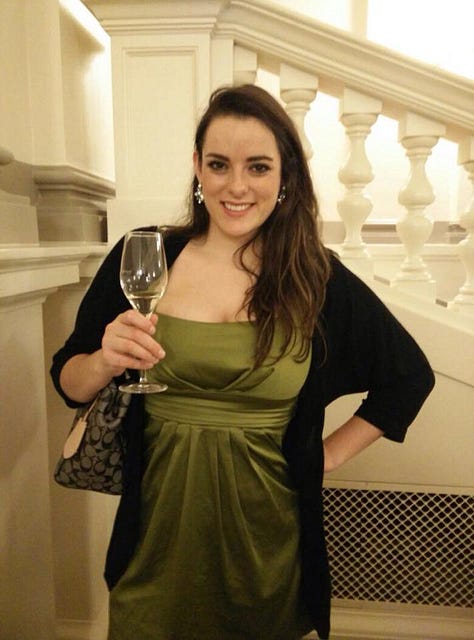





Military wifedom
We eventually settled into a newly built house in Weiden in der Oberpfalz, Germany situated in a military family neighbourhood in the German town, conveniently next to a supermarket (Edeka) and an Aldi and within walking distance to the historical town centre, the post office, and the train station (or Bahnhof conveniently located on the Bahnhofstraße – which means train station street).

I was fascinated by Aldi’s bread machine (you looked at pictures and pressed a button and the bread would appear) and the bottle ‘pfand’ return system where you slotted in bottles into a sort of cylindrical hole that looked like an ATM for bottles and it scanned the labels and gave you 0.25 Euro cents per bottle like magic. The machine spat out a coupon that you could use to discount your shop.
Of course, you actually paid the deposit or ‘pfand’ when you shopped the last time but it seemed very cool. I slowly tried to learn what the German food words were so I could understand that if I picked up ‘Forellen’ I was eating trout, as an example. The food was beautiful, fresh, and even organic food was inexpensive.
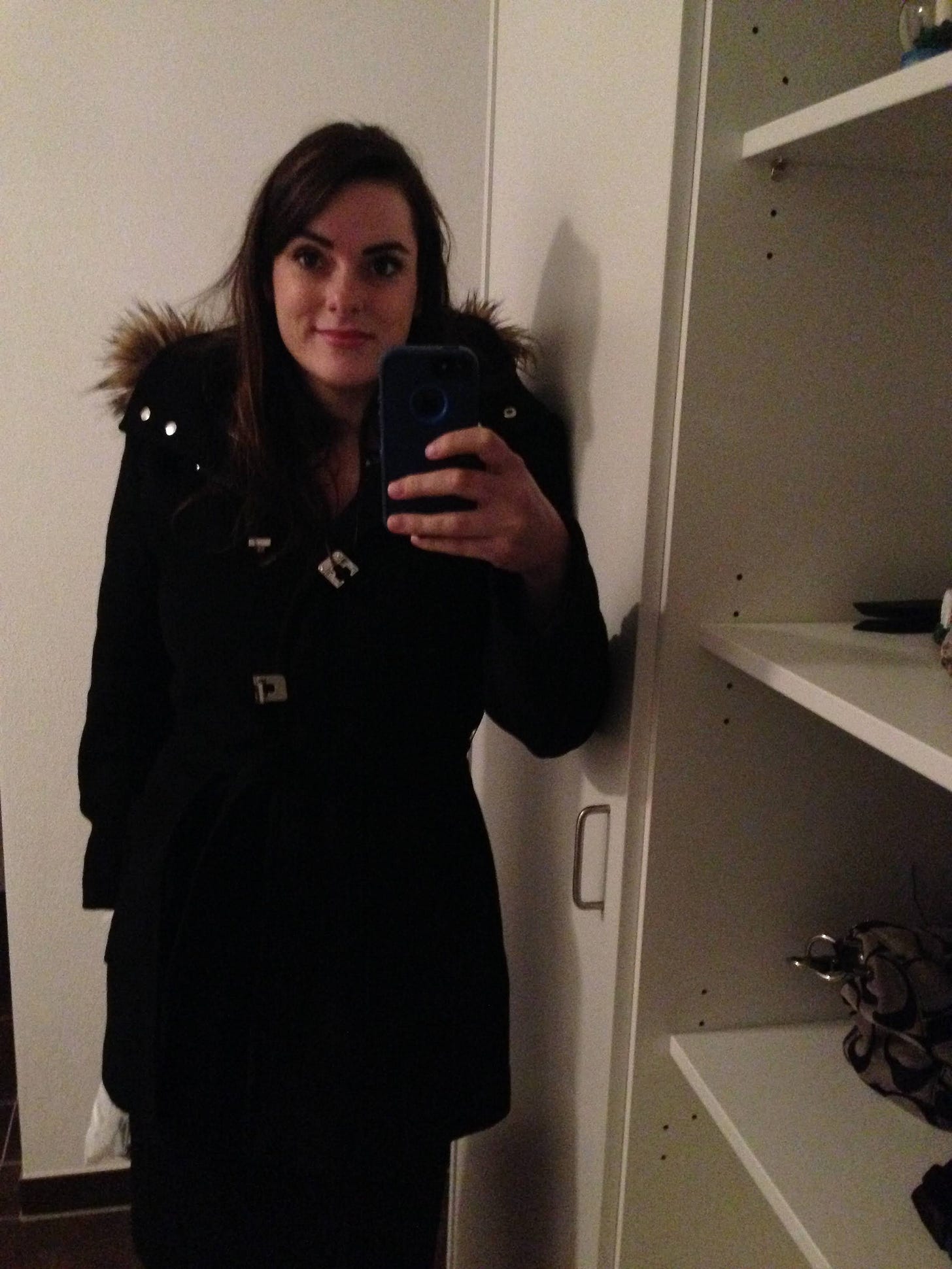
The town was 62 miles east of Nuremberg (or an hour’s drive) and 21 miles from the Czech border (or a 30-minute drive as I used to say) in the iconic Bavaria.
I recall our early days exploring the town and nearby Amberg (the most popular spot for single military men to live) on crisp Autumnal days, hand in hand, and going for various slices of cake (never sweet enough for my liking and with a sort of weird pie crust on the bottom) and tea (that came very disappointingly in a mug that was made of glass which does not steep tea effectively – the heat escapes and you sort of get tea-like water with milk instead).
Plus, the one Euro scoops of gelato (with inflation, I imagine these aren’t so inexpensive now).
Everything was new and exciting. Bavaria was breathtakingly beautiful and clean. The town’s main areas were colourful and impeccably landscaped.
Once our household goods arrived, I remembered unpacking and making the space as cosy as possible, which helped when we added Ikea bookcases, a new dining table that could seat eight to ten (and twelve at a push), and when we created our own paintings for the house.

Painting up a Pollock: Army wives setting up homes
Once, after visiting an art gallery, Benoit decided he liked Jackson Pollock’s work and we set about to recreate it. I’d been a painter and drawer in high school (I use this term very loosely – see example below) and wanted to re-adopt this hobby now I had more time.

It wasn’t as easy to re-create famous paintings as it looked but we had a big, lovely canvas to fill our wall and we enjoyed looking at the new painting in the dining room.
Benoit actually had better technique than I did and he got so into art that he later recreated another more sculptural canvas that involved dark silver paint on both sides of the canvas, an exacto knife, and twisting the material.
Benoit had what he called a “museum code” which was really a warning that I shouldn’t ask him if he liked any of the paintings in the gallery or museum unless he specifically said he liked something. Until he said he liked something, I should assume he doesn't like anything.
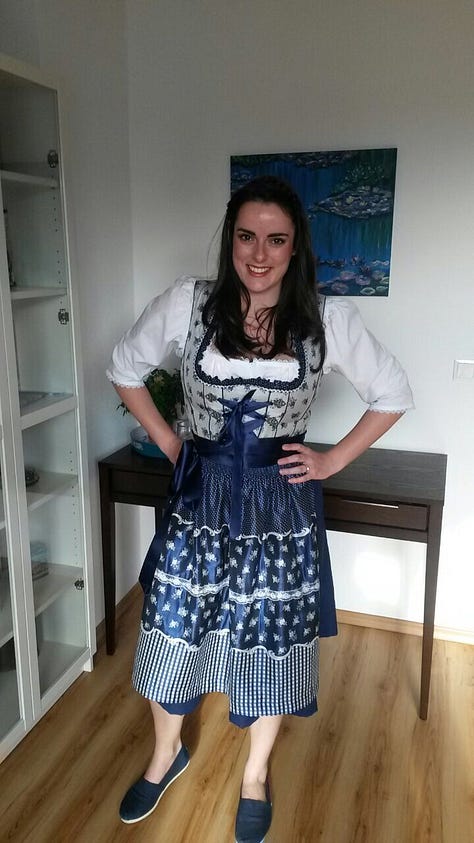


Galleries were always my thing so I suppose it was nice he indulged me. By contrast, Michael (my second husband) actually enjoys museums, galleries, and stately homes – and afternoon tea so it’s very much our thing and we don’t need a “museum code.”
It was always so interesting to see how other wives transformed the same basic box houses. We all had the same two or three-storey homes (with three or four bedrooms and three bathrooms) with a basement, done in basic finishings with white prickly walls.
Seriously, the texture on these walls could remove skin and the spiralling staircases with massive gaps between treads could catch an ankle. Surely you could lose people and small children between them? We even watched together once to see if our robot vac would plunge into the basement when it reached the staircase (it did not, thankfully).
Some wives like my amazing friend Victoria loved to paint the walls of her spaces with elaborate schemes, including stripes and chevrons. Every single wife had her own style and put her own stamp on it. Some husbands (and wives) were handy, building shelves, corner units, and re-finishing furniture – all in an effort to make these spaces warmer, and cosier for the duration of their stay.

Of course, all of that lovely work would have to be undone for the next occupier before moving out – like a sort of nomadic space, which I guess is what military housing is.
You’re in a place for three years (and five if you’re lucky) and then onto the next. The next white box to decorate.
Side note: however, generally when Stateside, military families buy their own houses as investment properties or rent ‘off post’ instead of living on the base. (Hence why Captain Thor and Hot Jewish Doctor lived in generic apartment complexes in Columbus, Georgia.)
We could have rented a flat in a German neighbourhood and many single people did that but it was simply easier to move into a military neighbourhood as they covered all the bills (social housing at its finest – except many Americans hate the dreaded world ‘socialism.’)
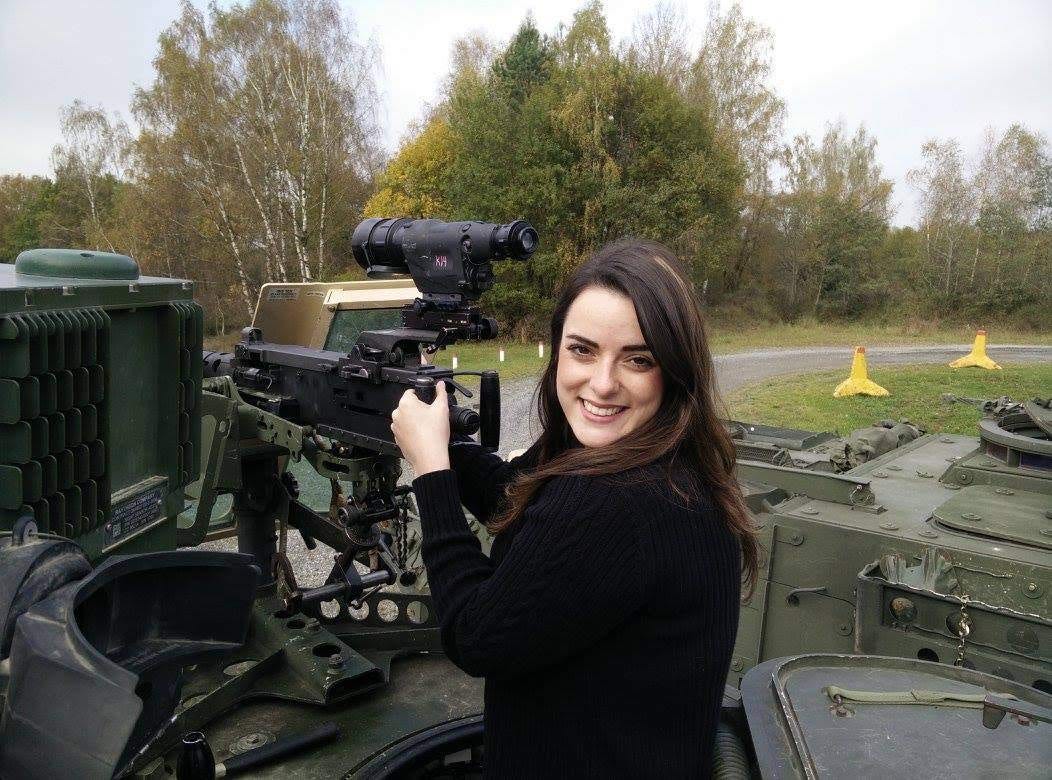
Some military spouses love this sort of adventurous life and as their commissioned and noncommissioned officer husbands remain in the military, get promoted, and increase their rank, continuing their careers until retirement, the community becomes smaller, and the chance of being stationed with the same military families increases. Yet sometimes these wives are spaced far away from the women (and their children) they have grown to know and love.
Many of the wives see this life as a privilege, a sometimes difficult one, where they are the glue that holds it all together.
The military wives I met were some of the most intelligent, beautiful (inside out and all that cliche), resilient, strong women I’ve ever encountered. And they were often unappreciated and the butt of collective jokes – not them personally but military spouses.
Words like “dependapotamus” were thrown about for wives who gained weight and depended on their husband’s income without realising that what these wives do for their spouses was sacrifice instead of “depend.” I found this sort of language abhorrent.

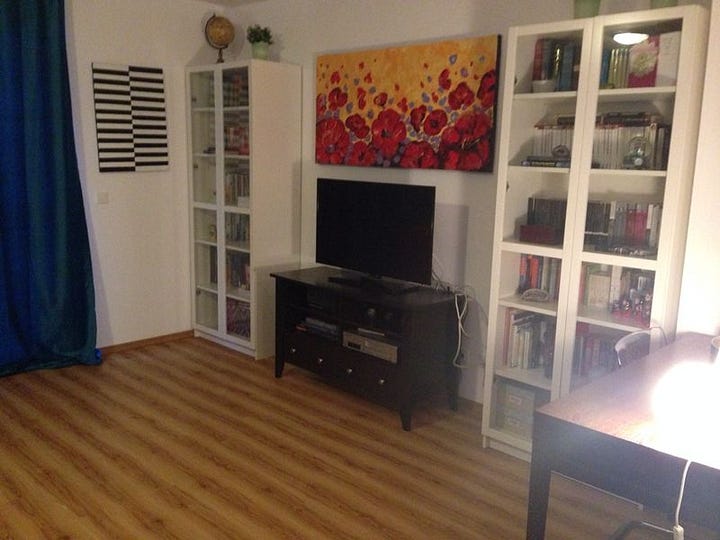


There were even dual military families where both spouses were soldiers and that was even more difficult. One of my first military life friends was a soldier named, Jen, who worked in military intelligence. I must have met her through my husband and she was such a solace for me and an ‘in’ in understanding this complicated new life I’d embarked on.
She married a fellow officer who worked as a lawyer for the military and she later obtained her law degree, too, and they now both live in California after a stint in DC. They are both out of the military now, though, as even getting stationed with your spouse can cause logistical issues and the spouse with the higher rank gets precedence, which means the other spouse may get stuck with MOSs (or the job you do in the military) that they do not want.
It was perhaps then that I observed how difficult it is for military spouses to have children, how often they become single parents in a marriage. It’s impossible for your spouse to be involved when he’s deployed for a year or when he’s out on training missions for weeks or months at a time.
That’s why friendships are so important for military wives. And the fathers to these children sometimes take on an almost mythical quality. Sometimes the father being home is more difficult for the mother than when he was deployed as she gets on with everything without him and then has to make space for him again, space for that connection, space for the disrupting of her routines.
Some women who have close family connections Stateside (i.e. parents to help with the children and big friend networks) decide to opt out of some military moves and create more stable lives for their children, so their husband goes alone to duty stations and visits his family like a guest.
The children who do move, though, the ones I encountered were some of the most interesting, intelligent, resilient little beings. Well-behaved, polite, and worldly in a good way – often well travelled – they experience more life in their short years than many Americans do in a lifetime.
For the military marriages that survive, these wives have to understand truly how marriage, partnership, and communication work so that the two always share a resilient bond that can be flexible yet unwavering through all the trials of military life.
During my marriage, my husband wasn’t gone for years but he was gone for weeks and months together. As I had to depend more emotionally on my girlfriends, that undid some of the closeness I had with my first husband, perhaps unknowingly.
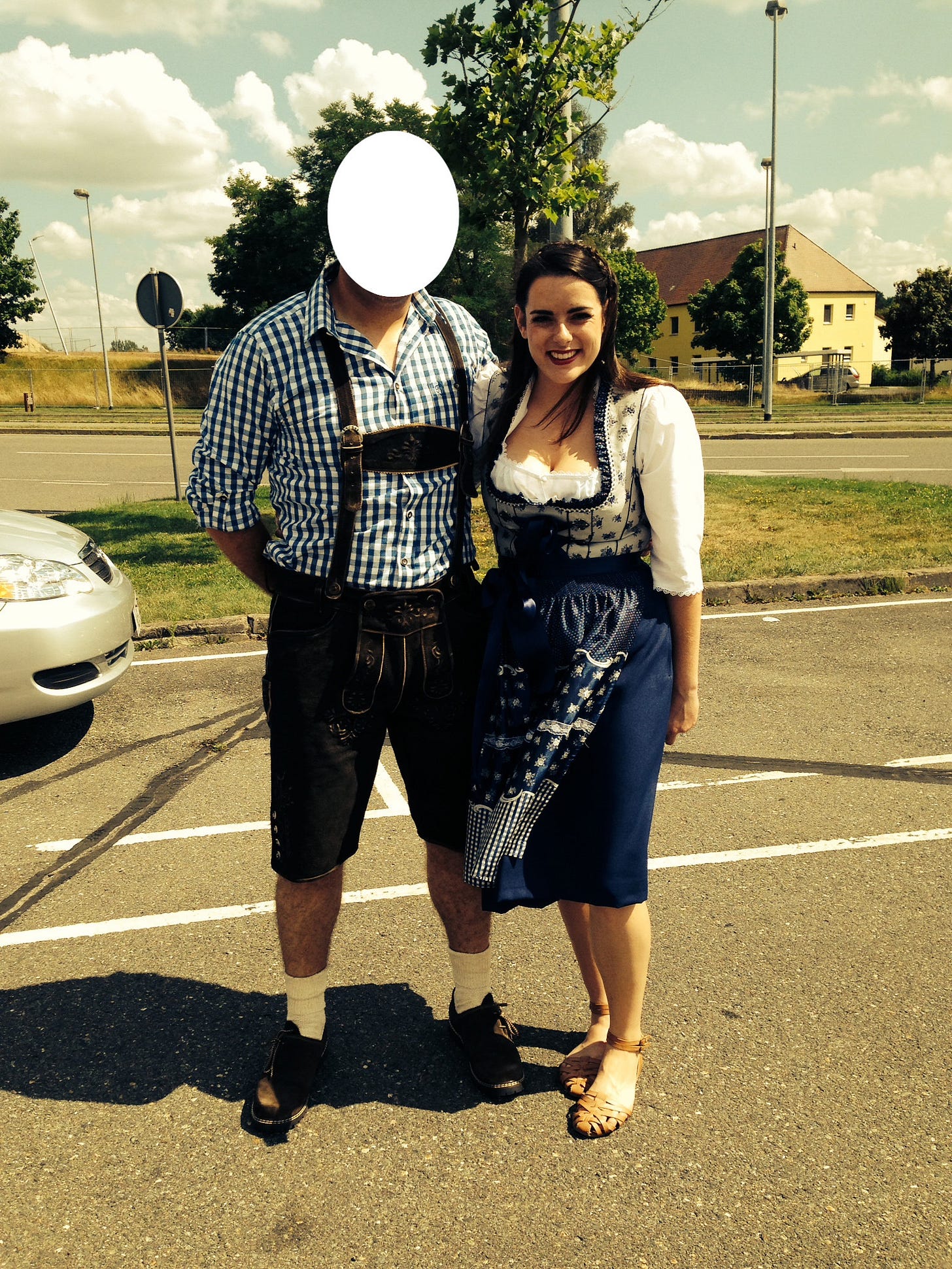
The Stepford Wife social aspect: my infamous afternoon tea parties
About the only way I did not fail as a military wife in my first husband’s eyes was in the social aspect of fulfilling my officer wifely duties. He had said that being friends with the ‘right sort of wives’ would be good for his career. I proclaimed vociferously that I found this notion repugnant and that I would not be friends with people or be smarmy to make the right connections. Thankfully, I never did have to befriend anyone I didn’t like.
Turns out, though, that the wives I liked were the ‘right ones’ (sigh). But they also happened to be some of the most amazing ladies I’ve ever known.
Before I worked two jobs in Germany (teaching university students at night and as a Kindergarten teaching assistant during the day – more on this in a bit), I used to host afternoon teas.
My amazing Canadian-Goan friend, Orienna, who was married to my husband’s commander (i.e. his big boss – I think her husband is a Major or Lt Colonel now so shoutout – but he was a Captain back then), knew how to make clotted cream so every few weeks or so I’d bake forty-eight small fruit scones (Mary Berry recipe), make about four loaves of various sandwiches (included Boursin and cucumber), and buy in the pastries (because who has time?).

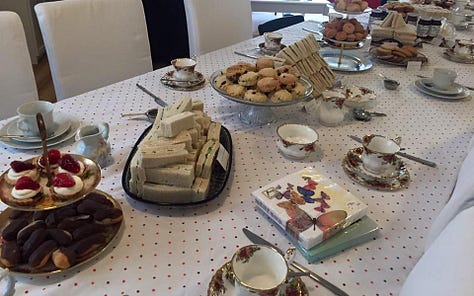
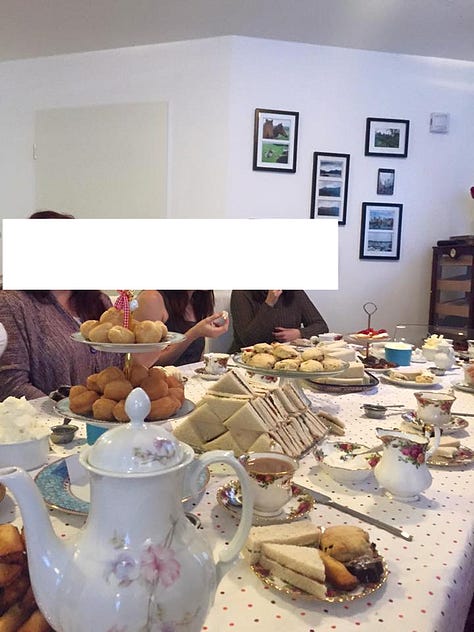
I loved having the opportunity to use my Alice’s Mad Hatter Tea Party assortment of mismatched China (although I had some matching ones, too) and gather with some amazing ladies. These afternoon teas were full of laughter and friendship.
And through this tea party, I met Victoria who Orienna had asked if she could bring along and at first I was hesitant, but saying yes was the best decision! Eventually, the ladies who became closest to me would help me make the afternoon tea items. Then, I’d send them all home with leftovers for themselves (or their husbands) and they’d help me do the washing up. Sometimes these devolved into chatting and prosecco drinking in the living room.
I eventually met my neighbours too and formed friendships with them. One of my closest girlfriends, Amy, was a former librarian and she hosted a book club. She was the most perfect hostess and her evenings included wine, olives, and cheese (a gourmet selection) that she’d present in the most stunning Polish pottery. I could never resist a good meal. Her Christmas decor was amazing as well and she had the coolest assortment of German smokers and the kind of things they sell at Käthe Wohlfahrt.
There were so many events, outings, dinner parties, and trips. These women were warm, kind, helpful, and amazing at planning and hosting parties.
Spending so much quality time with women in a short space of time and the kind of honest interactions that military spouses are used to means you become very close very quickly. I have never bonded with a group of ladies the way I did with my '“Germany Ladies.” I’m so thankful I had (and still have) many of these ladies in my life – and forever in my heart (cheesy, I know).





Parties and events
Orienna and Victoria would host various gatherings and dinner parties (their serving platters were from a famous pottery place in Italy’s Positano I think).
Side note: the military wives either fell into the Polish Pottery camp or the Italian Pottery camp (I went full Polish but with gifted pieces from Victoria and Orienna in my home from the Italian place) alongside our Bavarian crystal (which I may talk about at some point).
I recall a Thanksgiving or two at Victoria’s and one at my friend Jayde’s. Jayde hosted the Halloween parties and as the leader of our Family Readiness Group (FRG), Orienna hosted many gatherings and events like Christmas.

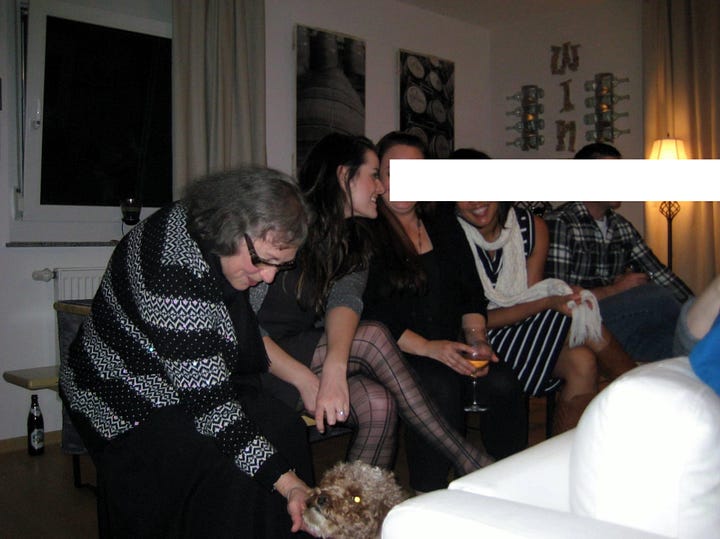

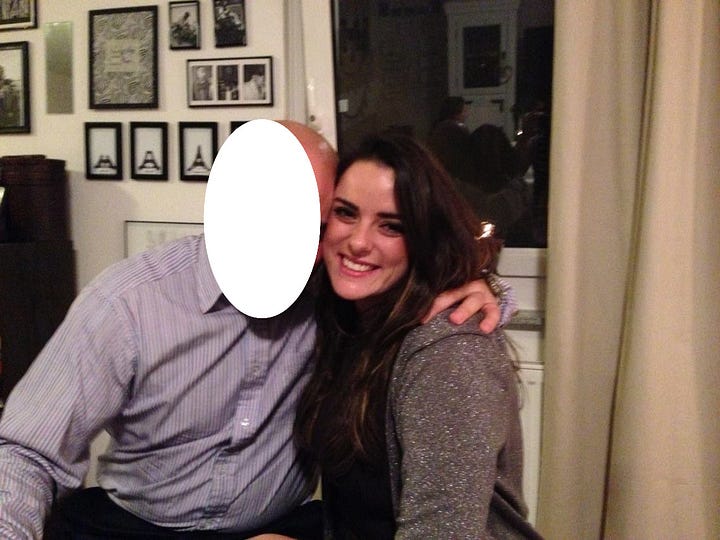
I had a neighbour, a different Amy (non-librarian Amy), who started a fun Elf tradition where you photocopied this Elf poem and left a gift on another neighbour’s door around Christmas. It was a game of ‘pay it forward' to bring lots of holiday cheer.


Germany was decorated beautifully at Christmas and the Christmas markets are magical. I always preferred the smaller markets and our favourite was the Medieval Christmas market at Schloß Guteneck. Our part of Barvaria was quite religious so for events like Easter the town square would be decorated as well. Plus, the Germans were always on holiday!
There was cookie decorating, cookouts, nights out, cinema viewings on post and off (plus we still did DVD rentals), trips to German towns, Christmas markets, Oktoberfest, and European get-togethers. There were military events (cookouts, a ball), family nights and meals (i.e. where all of the unit meets up at a German restaurant to eat and to socialise), and Saber Coffees (where the officer’s wives would meet hosted by the perfectly coiffed, stylish former cheerleader ‘head wife’ who was the wife of the Lt. Colonel of the military base).
With the Saber Coffees, wives paired up each month to host the event at one of our houses. The tea party event I hosted at my house alongside another wife went off without a hitch and was talked about for weeks (much to my ego boost).
I no longer recall what exactly we discussed in these meetings but I think it was all about making the wives of whomever your husband was in charge of feel welcome and then talk about whatever events were coming up. I mean maybe some of my fellow former military wives (especially the ones who are still married to their servicemen) can fill me in?
Can you already see how many activities a military spouse is meant to do and that is before work (if you can find it ‘off post’ as they call anywhere off the military base) or children (not sure how the women with jobs and children managed it).

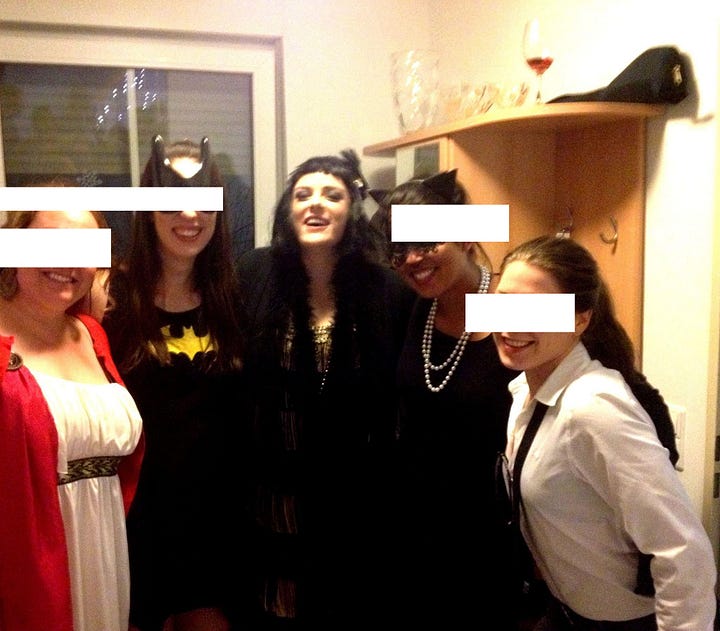
Many wives could not get hired as they moved haphazardly around the US and various places in Europe. There just weren’t enough jobs on the German base as part of the US agreement with Germany is to hire so many German nationals and then so many military spouses but there were also contractors and former military personnel vying for these jobs. There was this whole complicated ranking system that determined if you’d ever get an interview.
Some high-powered wives had consultancy firms where they did medical billing – or something or other – or accounting and others like my neighbour, Melissa, who was a nurse flew back to Boston to do bank shifts every now and then (I’m guessing the money merited the flight but also she could return to see her parents – she married her brother’s best friend as they were both West Point trained officers if I recall correctly).
Others wanted jobs but couldn’t get them. Others had their hands full with a brood of children. And the more seasoned wives realised that their job was in household and budgetary management. (And attending 50,000 events per year.)
But despite the fact that military salaries are quite generous (as in several thousand per month – you also enjoy free healthcare, dental care, housing, and electricity and water – so imagine if all you had to pay for was transport, food, and disposable income – and free healthcare in America is unheard of and so is annual leave and they got that too), my husband still wanted me to find a job because, you know, I didn’t have children. In addition to all of those social events.
I found a wall calendar (I did throw it out) where that December we left Germany, we had at least four plus social events to attend every night of every week leading up to Christmas. That is how most of our months were. Jam-packed. And I was working two jobs. (I loved a social event back then!)




The perfect life crumbling
In Columbus, Georgia, we had existed in a semi-perfect bubble and we seemed very happy (minus the odd glitches of my old life popping up – read here and here).
I was behaving myself like a good wife. Playing house. As I said, we did the household things together.
I was working my three jobs and when the legal assistant job was cut, I worked at a gym as a receptionist where this one guy who worked there negged me and told me I looked “just like his ex-girlfriend.” I don’t know if that was a line or he was being legitimate but I mostly avoided him and his aggressive behaviour.
I did get to know some gems at the gym, though, like this one lady Ms Vertie (all older people in the South are referred to as Ms or Mr and their first name as a sign of respect). Ms Vertie had also been a military wife and I was very newly married. She was slender and always had her bobbed hair in a glam style with a full face of makeup and she came to work out almost every day without fail.
She was the perfect Southern Belle, greeting everyone with a wave and a smile and asking how they were and after their families (if she knew them). She was widowed and must have been in her late 70s then. Sadly, one day a few years ago, I went to look her up – we’d occasionally still message and she’d commented on the odd travel photo back then – and found her obituary (she died in 2022 at age 85).
Back to moving to Germany, despite doing household bits together in Columbus, now it was as if I was expected to do the housework alone. To me, two independent grown adults who just happen to be married aren’t suddenly incapable of doing their own share of domestic duties.
Of course, I couldn’t vocalise this at the time. I was just really sad that I suddenly was subjected to all of these expectations, something I knew I hated doing and would fail at.







I recall how before I worked, I’d greet Benoit at the door like an excited puppy, throwing my arms around him and kissing his face every day. Maybe he’d grumble about the shoes I left lying around instead of putting them in the hall closet (disregarding the fact I tidied after him when he dumped 50,000 coins in one of the guest bedrooms where he got ready for work in the morning as not to disturb me when he woke before 5 am).
And sometimes I’d be all like, “Guess what? I did the laundry today. Aren’t you going to praise me?” sort of thing and he’d be like, “You aren’t supposed to expect praise for doing normal tasks.” But they weren’t “normal” to me, they were the most difficult and cumbersome task and I hated the drudgery of it.
I wanted an acknowledgement that I did the thing. Why was it so difficult to give praise if it motivated me and I’d leave these interactions feeling utterly deflated and unappreciated?

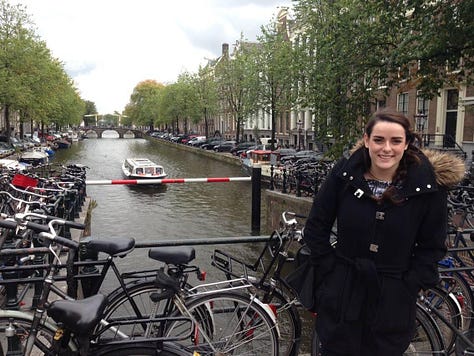





As I said, finding a job as a military spouse was difficult. There were the various complicated applications to navigate and often (like now in job applications), you’re just ghosted. I did, however, around nine months into living in Germany, land an interview for a Kindergarten teaching assistant job, which paid well for ‘part-time work’ which was 35 hours per week.
Ironically, my English full-time editorial role now where I manage a European team is only 35 hours per week (and 33 hours if you count the 2 hours per week ‘pause for performance’ time we are generously given where I enhance my performance by having a long lunch four days per week because mental well-being is a thing).
And let me tell you, despite the fact I was continually sick for the first six months, working with children was such a joy and the Kindergarten teacher who was my manager (who had been teaching thirty years or more) was one of the best educators I’d seen. She was very kind and put up with my being (very often) late and making mistakes (thank you – although I’m sure you don’t read this). She was happy when I reorganised the entire closet system but kind when I put a kid on the wrong bus (and that kid belonged to a very high-ranking officer – I still cringe about this now – eek).
She was kind but boundaried and the children loved her. Seeing their journeys from the beginning of class to the end was amazing, how capable she made them feel. It was one of the most enjoyable jobs I’ve had. Children ages five to six are just adorable and hilarious. I always did have a penchant for the ‘naughty’ kids because they had a lot of personality. (Maybe they reminded me of baby sister Hannah as a child.)
She and her partner Kindergarten teacher in the classroom (connected to hers by a kitchen) used to bring in the most delicious food and baked goods and thus, I gained weight because I’m like a truffle pig during any buffet sitch. The teacher’s aid for the other teacher, Amanda, who was a lovely friend somehow resisted too many of these treats and thus kept her slim figure.
Then, for Fall 2014, I landed a job teaching university classes as an adjunct instructor for one of the universities represented on base. I taught the equivalent of English 101 or 102, writing and research, to military students, generally enlisted soldiers who maybe wanted to work their way up to officers or get better pay.
This job per technical hour was a lot better paid than the Kindergarten job (something like $56/hour); however, if I’d really factored in the amount of time, energy, and life goes into teaching, it probably (read: definitely) wouldn’t have been worth it.
In fact, I found an email where my Mum said as much about how in teaching in the past I was paid for two hours and worked eight! She was asking me if it was worth it but my first husband put pressure on me to ‘do my part’ in the marriage so I felt I ought to take every employment opportunity available to me.
Per teaching hour, this job paid much higher than those adjunct roles in the past, but it was not worth the stress. Although I always loved making my students better writers – and the lovely students – I equally was never good at managing the students who seemed outright to dislike me for whatever reason (and there was always one or two per semester).
So, two days per week I’d do the hours at the Kindergarten which I think were something like 7.30am to 3.30pm and then teach my university classes from 6pm to 9pm and then I’d have grading and all sorts to do each week as well, which was additional hours outside of the six actual teaching hours.

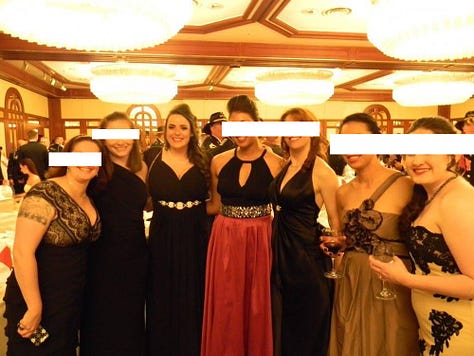


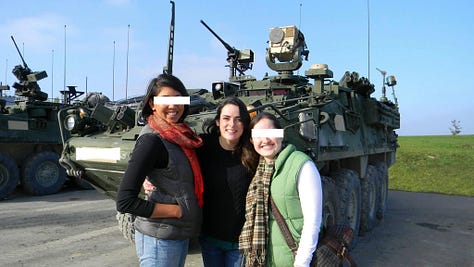

I think this is something that my ex never understood. Before grading, I was working 41 hours. Factor in a five-day-per-week commute of 45 minutes each way that’s another 7.5 hours in driving not counting the commute from the elementary school on the Grafenwoehr base to the university on the Vilseck one. That’s 48.5 hours of “work” before I factored in at least 5 to 10 hours of grading and lesson planning each week plus all of the social engagements of military wife life. This is depressing to calculate.
And in memory, I’m still filled with the sense of failure. But really, I was overworked and had too much on. I could not also take on the domestic load as well. Or mind reading.
Maybe military work was difficult. I have no clue because I barely knew what Ben did but I could say that working two jobs and having the weight of expectations from a husband was equally difficult. It was my cross to bear so to speak.
Benoit thought my inability to tidy the house or have dinner on the table, my habit of unwinding in ways he disapproved of, and my having long lie-ins on the weekend was utter laziness. He’d married a disappointing wife who just didn’t have it together like the other wives.
I recall him surprising me with a cooked dinner he made only twice during our marriage after I came back from teaching.
What was worse was I didn’t even look like the woman he married either. I had the audacity to gain weight, to look scruffy when I woke up or was lounging around the house. He had married a flawed human woman, a true “hot mess” and not some svelte celebrity-like working housewife creature who could do it all.
I was the only wife I knew who worked as much as I did (really, besides a couple of others who did consultancy). And he discounted the fact that I earned nearly half his salary which I deposited (very misguidedly) into his account (more on this coming up).
I was used to a gruelling life plan (pre-marriage) but I’d thought I’d married a safe harbour, someone who would take care of me in return for love. Instead, I was subtly told of all my shortcomings, of all the ways I didn’t measure up.
Coming up next, the cracks I noticed in our marriage, the ways I didn’t know how to fix it.
New here or haven’t followed from the beginning, why don’t you catch up on the other seventy-seven posts I’ve written, including the one on why I’m writing these chapters in the first place – with the odd “present day snippet” of what is happening in my world lately. (Spoiler: things are much, much better.)
If you’re married or partnered, how do you divide the domestic load?
#79 THE CRACKS THAT APPEARED WITH MY EX/FIRST HUSBAND
This post has officially become just shy of a novella (or the equivalent of two of my longer posts) so you may have to view it in the app. I’d say that it’s a record even for me! I thought about breaking it up but the narrative flows as one piece so I hope I’ll get some readers but do feed-back if it is just too long. The next chapter will be shorter (promise).







Elaine, I’m exhausted just reading what you were able to do—can’t imagine keeping up that pace. I don’t remember ever having that much energy.
I relate with so much, though. When I was married she always had a job but I had mine and a part time or two for the extra income, and I did much of the housework. We also had our 4 kids.. Marriage for me was rewarding but often exhausting. I’m so glad you have found a better fit.
Lastly, praise and appreciation do go so far to help us all! I hope I’ve gotten better at noting things others do that benefit me/us and speaking up to let them know. And so in that vein… thank you for helping to make my quiet life more interesting and fun 🎉 I appreciate you sharing so much of yourself with us and taking the time to write, and read, and post, and... 😊
You looked very happy in all social settings with the wives, I'm glad you have a support system, so to speak. Although that word, dependopa... That's a big red flag. I think what you wrote was really interesting here "Aren’t you going to praise me?” sort of thing and he’d be like, “You aren’t supposed to expect praise for doing normal tasks.” But they weren’t “normal” to me, they were the most difficult and cumbersome task and I hated the drudgery of it." I feel like you had been autonomous your whole life, and now expectations were put on you. Still not sure if you were truly happy or if you were starting to see the cracks and finding joy on other things (kindergarten, exploring, dressups, friendships)...